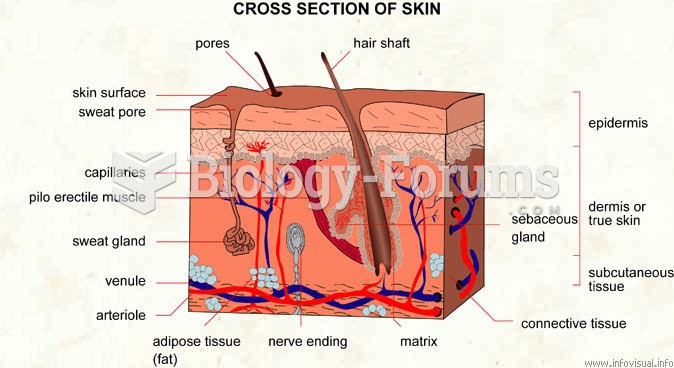Answer to Question 1
Answer: The skin consists of three layers: (1) the epidermis, or outer protective layer, where new skin cells are constantly produced; (2) the dermis, or middle supportive layer, consisting of connective tissue that stretches and bounces back, giving the skin elasticity; and (3) the hypodermis, an inner fatty layer that adds to the soft lines and shape of the skin. As we age, the epidermis becomes less firmly attached to the dermis, fibers in the dermis thin and lose their elasticity, cells in both the epidermis and dermis decline in water content, and fat in the hypodermis diminishes, leading the skin to wrinkle, loosen, and feel dry. In the thirties, lines develop on the forehead as a result of smiling, furrowing the brow, and other facial expressions. In the forties, these become more pronounced, and crows-feet appear around the eyes. Gradually, the skin loses elasticity and begins to sag, especially on the face, arms, and legs. After age 50, age spots, collections of pigment under the skin, increase. Blood vessels in the skin become more visible as the fatty layer thins. Because sun exposure hastens wrinkling and spotting, individuals who have spent much time outdoors without proper skin protection look older than their contemporaries. And partly because the dermis of women is not as thick as that of men and estrogen loss accelerates thinning and decline in elasticity, womens skin ages more quickly.
Answer to Question 2
Answer: Low daily doses of estrogen can reduce the physical discomforts of menopause. Hormone therapy comes in two types: (1) estrogen alone, or estrogen replacement therapy (ERT), for women who have had hysterectomies; and (2) estrogen plus progesterone, or hormone replacement therapy (HRT), for other women. Combining estrogen with progesterone lessens the risk of cancer of the endometrium, which has long been known as a serious side effect of hormone therapy. Hormone therapy is highly successful at counteracting hot flashes and vaginal dryness. It also offers some protection against bone deterioration. Nevertheless, it is associated with an increase in heart attack, stroke, blood clots, breast cancer, gallbladder disease, and deaths from lung cancer. ERT, when compared with HRT, intensifies the risk of blood clots, stroke, and gallbladder disease. And women age 65 and older taking HRT show an elevated risk of Alzheimers disease and other dementias. Women and their doctors should make decisions about hormone therapy carefully. For those who opt to use it, taking the lowest dose possible for the shortest time possible in the early menopausal years minimizes risk. Women with family histories of cardiovascular disease or breast cancer are advised against hormone therapy. Fortunately, the number of alternative treatments is increasing.






